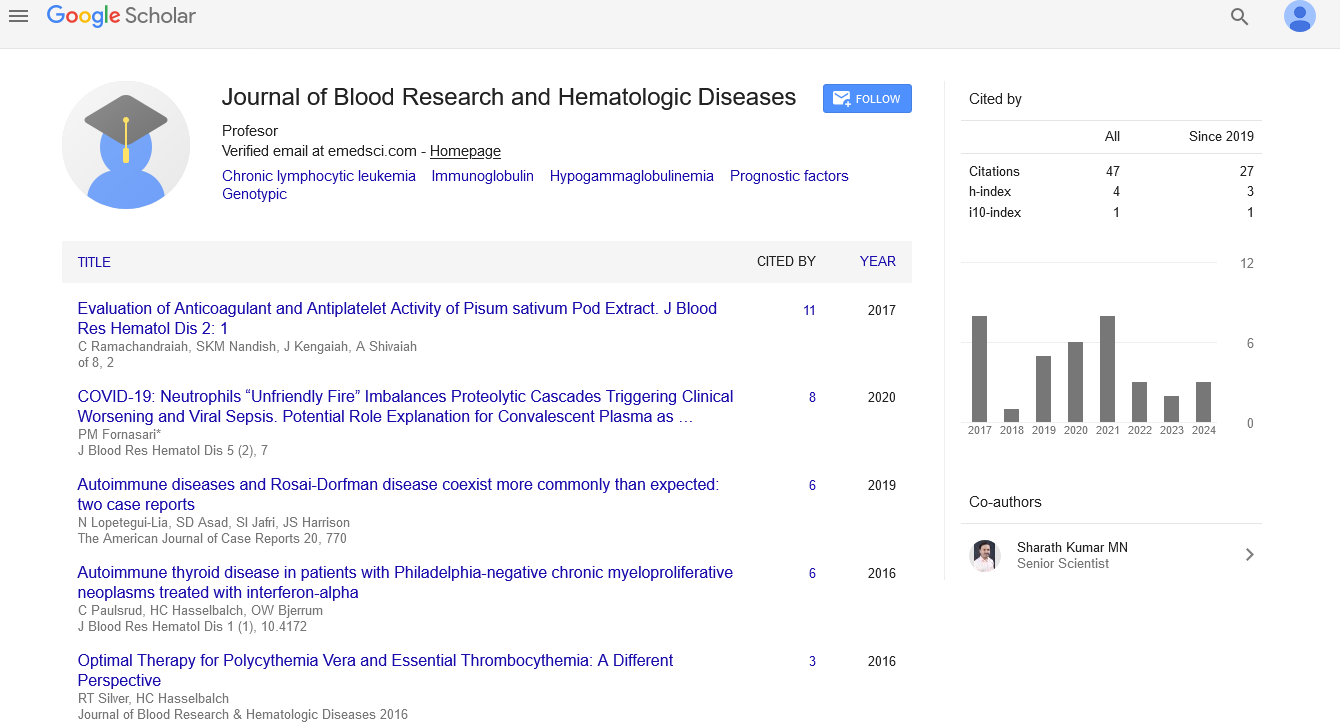Perspective, J Blood Res Hematol Dis Vol: 10 Issue: 1
Innovative Therapeutic Approaches for Managing Myeloma
Wahchion Tobysell*
Department of Haematology, Imperial College Healthcare NHS Trust, London, United Kingdom
*Corresponding Author:Wahchion Tobysell
Department of Haematology, Imperial College Healthcare NHS Trust, London, United Kingdom
E-mail:wahchionto@gmail.com
Received date: 24 May, 2024, Manuscript No. JBRHD-24-137142;
Editor assigned date: 27 May, 2024, PreQC No. JBRHD-24-137142(PQ);
Reviewed date: 11 June, 2024, QC No. JBRHD-24-137142;
Revised date: 10 March, 2025, Manuscript No. JBRHD-24-137142(R);
Published date: 17 March, 2025, DOI: 10.4172/jbrhd.1000217
Citation: Tobysell W (2025) Innovative Therapeutic Approaches for Managing Myeloma. J Blood Res Hematol Dis 10:1.
Introduction
Multiple myeloma, a cancer of plasma cells in the bone marrow, presents significant challenges due to its complex biology and potential for resistance to traditional treatments. Over the past few decades, advancements in research have led to the development of innovative therapeutic approaches aimed at improving outcomes and quality of life for patients. This article explores some of the cuttingedge strategies and therapies currently being utilized in the management of multiple myeloma.
Understanding multiple myeloma
Multiple myeloma is characterized by the abnormal proliferation of plasma cells, which are a type of white blood cell responsible for producing antibodies. In myeloma, these plasma cells become cancerous and accumulate in the bone marrow, crowding out normal blood-forming cells. This can lead to bone damage, anemia, kidney dysfunction, and suppressed immune function.
Description
Conventional treatment approaches
Traditionally, treatment for multiple myeloma has involved combinations of chemotherapy, corticosteroids, Immunomodulatory Drugs (IMiDs), proteasome inhibitors, and stem cell transplantation. While these therapies have improved survival rates and quality of life for many patients, challenges such as drug resistance and disease relapse remain significant.
Innovative therapeutic approaches
Monoclonal Antibodies (mAbs): Monoclonal antibodies are engineered to target specific proteins on the surface of myeloma cells, marking them for destruction by the immune system or delivering cytotoxic agents directly to the cancer cells. Examples include daratumumab and elotuzumab, which have shown efficacy both as monotherapy and in combination with other treatments.
CAR T-Cell therapy: Chimeric Antigen Receptor (CAR) T-cell therapy involves genetically modifying a patient's own T cells to express receptors that recognize and attack proteins found on myeloma cells. FDA-approved CAR T-cell therapies for myeloma, such as idecabtagene vicleucel (ide-cel), have demonstrated promising results in patients who have relapsed or are refractory to other treatments.
Targeted therapies: Targeted therapies inhibit specific molecular pathways that drive the growth and survival of myeloma cells. Examples include targeted proteasome inhibitors like ixazomib and Selective Inhibitors of Nuclear Export (SINE) compounds such as selinexor, which block the export of proteins essential for myeloma cell survival.
Immunotherapy combinations: Combining different immunotherapy approaches, such as checkpoint inhibitors (e.g., pembrolizumab) with IMiDs or mAbs, aims to enhance immune response against myeloma cells and overcome immune evasion mechanisms.
Precision medicine and genomic profiling: Advances in genomic profiling allow for the identification of specific genetic mutations and abnormalities driving myeloma growth. This enables personalized treatment strategies, including the use of targeted therapies and clinical trials investigating novel agents.
Clinical trials and emerging treatments
Clinical trials play a crucial role in evaluating the safety and efficacy of new therapeutic approaches for multiple myeloma. Investigational therapies may include next-generation proteasome inhibitors, novel IMiDs, bispecific antibodies targeting multiple antigens, and immune-modulating agents designed to enhance immune response.
Challenges and considerations
While innovative therapies offer promising avenues for improving outcomes in multiple myeloma, several challenges and considerations remain:
Drug resistance: Some patients may develop resistance to treatment over time, necessitating the exploration of alternative therapies and combination strategies.
Toxicity profiles: Managing the side effects associated with novel therapies, such as immune-related adverse events with checkpoint inhibitors or cytokine release syndrome with CAR T-cell therapy, is crucial for optimizing patient care.
Cost and access: Access to innovative therapies can be limited by cost and healthcare system disparities, highlighting the need for equitable access and affordability.
Future directions
The landscape of multiple myeloma treatment continues to evolve rapidly, driven by advances in immunotherapy, genomics, and personalized medicine. Future research aims to unravel the molecular mechanisms underlying disease progression, identify biomarkers predictive of treatment response, and develop strategies for overcoming drug resistance.
Conclusion
In conclusion, innovative therapeutic approaches are revolutionizing the management of multiple myeloma, offering new hope for patients facing this challenging disease. From monoclonal antibodies and CAR T-cell therapy to targeted inhibitors and personalized medicine strategies, these advancements underscore the transformative potential of research and collaboration in improving outcomes and quality of life for individuals living with multiple myeloma. As ongoing research and clinical trials continue to expand our understanding and treatment options, the future holds promise for further enhancing therapeutic efficacy and patient outcomes in the fight against multiple myeloma.
 Spanish
Spanish  Chinese
Chinese  Russian
Russian  German
German  French
French  Japanese
Japanese  Portuguese
Portuguese  Hindi
Hindi 